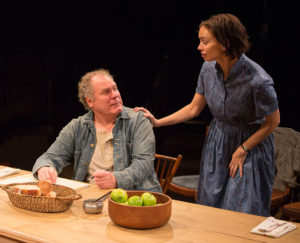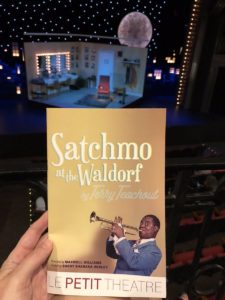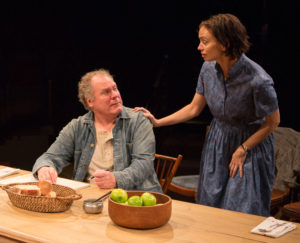Mrs. T and I just returned from a much-needed holiday at Ecce Bed and Breakfast, our favorite retreat. One of the books that I brought along with me to read was Some Buried Caesar, the sixth of Rex Stout’s Nero Wolfe novels, published in 1939. In it Archie Goodwin makes the following remark about Lily Rowan, his on-again-off-again girlfriend: “I was wondering which would be more satisfactory, to slap her and then kiss her, or to kiss her and then slap her.” I must have read the book a dozen times over the years, but never until now had that line caught my eye.
Suddenly a coin dropped in my head and I remembered another line…
Read the whole thing here.



 The leaves are falling in Connecticut. Mrs. T brought a box of
The leaves are falling in Connecticut. Mrs. T brought a box of  The good news is that if you like fall foliage, as we both do, there aren’t many places in the world that are prettier than Connecticut come mid-October. In the meantime, and seeing as how yesterday was our eleventh anniversary, we decided to treat ourselves to a mini-vacation, our previous attempt to do so having
The good news is that if you like fall foliage, as we both do, there aren’t many places in the world that are prettier than Connecticut come mid-October. In the meantime, and seeing as how yesterday was our eleventh anniversary, we decided to treat ourselves to a mini-vacation, our previous attempt to do so having  Be that as it may, it’s true that Mrs. T and I have just weathered a rough patch, rough enough that my eyes filled with tears as I listened the other night to the lines that Sonya speaks at the end of Uncle Vanya, the Chekhov play that I love best and about which I
Be that as it may, it’s true that Mrs. T and I have just weathered a rough patch, rough enough that my eyes filled with tears as I listened the other night to the lines that Sonya speaks at the end of Uncle Vanya, the Chekhov play that I love best and about which I  Nor is it possible to store up present laughter in preparation for a time when it’s in short supply. Would that it were, but all you can do is take life as it comes, and that’s what Mrs. T and I are going to do this week. Mere days from now, there’ll be gaudy sunbursts of red, yellow, and orange wherever we look, followed as sure as the turning of the earth by bare branches. The leaves are falling and the clock is ticking, and we mean to revel in our good luck while it lasts.
Nor is it possible to store up present laughter in preparation for a time when it’s in short supply. Would that it were, but all you can do is take life as it comes, and that’s what Mrs. T and I are going to do this week. Mere days from now, there’ll be gaudy sunbursts of red, yellow, and orange wherever we look, followed as sure as the turning of the earth by bare branches. The leaves are falling and the clock is ticking, and we mean to revel in our good luck while it lasts. I’ve been too preoccupied of late to mention it here, but Satchmo at the Waldorf opened last week at New Orleans’ Le Petit Theatre in a brand-new production directed by Maxwell Williams and starring Barry Shabaka Henley, who previously appeared in Satchmo at Chicago’s Court Theatre and Palm Beach Dramaworks. I first worked with Shabaka in Chicago and directed him in Palm Beach, and on both occasions I was dazzled and delighted by his performance of the demanding triple role of Louis Armstrong, Joe Glaser, and Miles Davis.
I’ve been too preoccupied of late to mention it here, but Satchmo at the Waldorf opened last week at New Orleans’ Le Petit Theatre in a brand-new production directed by Maxwell Williams and starring Barry Shabaka Henley, who previously appeared in Satchmo at Chicago’s Court Theatre and Palm Beach Dramaworks. I first worked with Shabaka in Chicago and directed him in Palm Beach, and on both occasions I was dazzled and delighted by his performance of the demanding triple role of Louis Armstrong, Joe Glaser, and Miles Davis.
 What Mr. Tucker has done to the two plays out of which “Uncle Romeo Vanya Juliet” has been cobbled together is easier to enjoy than it is to describe. Bits and pieces of “Vanya” and “Romeo” alternate without warning throughout the evening, juxtaposed in a way that is more than a little bit surrealistic…
What Mr. Tucker has done to the two plays out of which “Uncle Romeo Vanya Juliet” has been cobbled together is easier to enjoy than it is to describe. Bits and pieces of “Vanya” and “Romeo” alternate without warning throughout the evening, juxtaposed in a way that is more than a little bit surrealistic… No less striking in its purposefully undemonstrative way, though, is the New York premiere of Richard Nelson’s adaptation of “Uncle Vanya,” the auspicious inaugural production of Hunter College’s new Hunter Theater Project, in which professional productions are to be mounted under the aegis of the school’s drama department. This tightened-up version (it runs for 105 intermission-free minutes) is performed in modern dress and modern English (Mr. Nelson, who is also the director, translated the play in collaboration with Richard Pevear and Larissa Vokokhonsky). The goal is to make “Vanya” more intimate and conversational, with 12 area mikes used to subtly boost the volume…
No less striking in its purposefully undemonstrative way, though, is the New York premiere of Richard Nelson’s adaptation of “Uncle Vanya,” the auspicious inaugural production of Hunter College’s new Hunter Theater Project, in which professional productions are to be mounted under the aegis of the school’s drama department. This tightened-up version (it runs for 105 intermission-free minutes) is performed in modern dress and modern English (Mr. Nelson, who is also the director, translated the play in collaboration with Richard Pevear and Larissa Vokokhonsky). The goal is to make “Vanya” more intimate and conversational, with 12 area mikes used to subtly boost the volume…